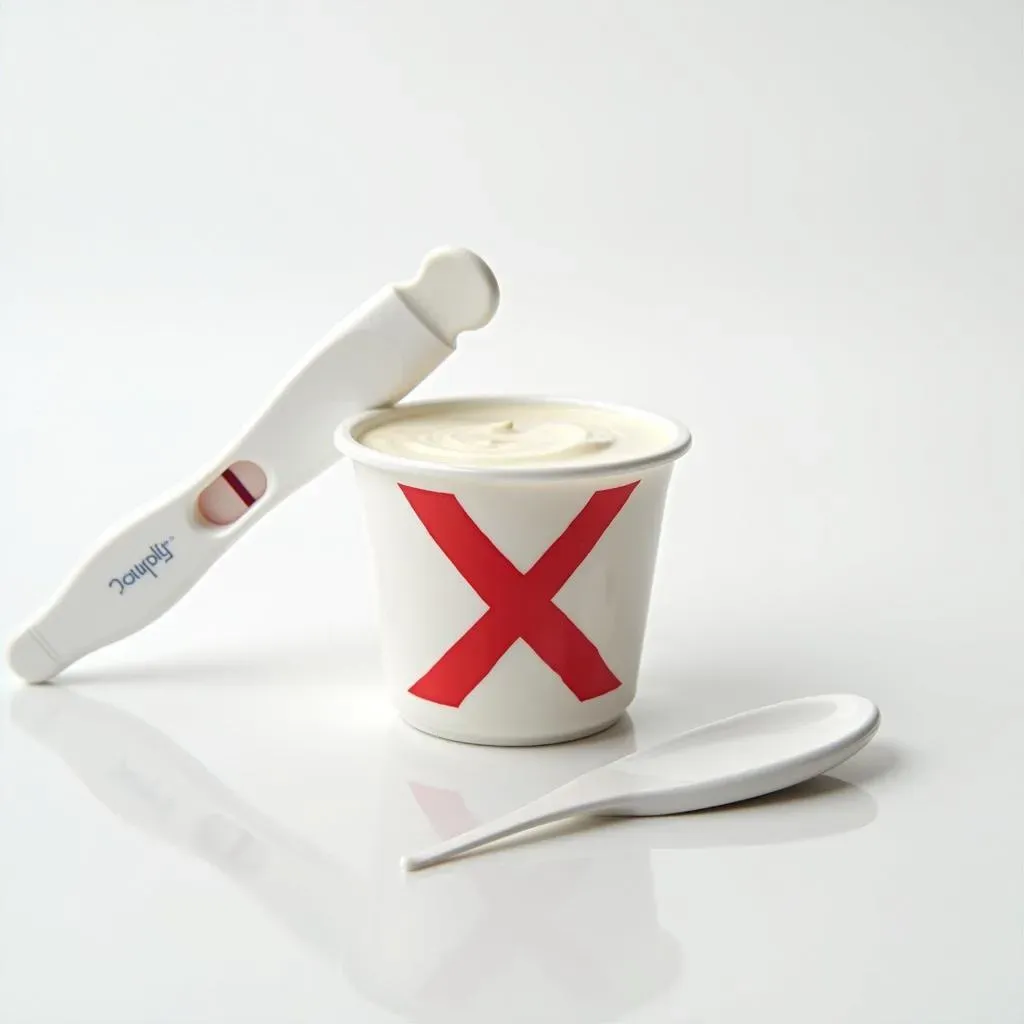Table of Contents
Pregnancy cravings can be a whirlwind, and yogurt often finds its way onto the list. But with so many options lining the dairy aisle, is low fat yogurt during pregnancy a healthy choice? Or are there hidden risks lurking beneath that creamy surface? This article dives deep into the world of yogurt, separating fact from fiction to help you make informed decisions for you and your baby. We'll explore the potential benefits of yogurt, including its calcium and probiotic content, and weigh them against the possible downsides associated with low-fat varieties, such as added sugars and artificial sweeteners. We'll also navigate the confusing labels and offer practical tips on choosing the best yogurt for your pregnancy journey. Finally, if yogurt just isn't your thing, don't worry. We'll provide some delicious and nutritious alternatives to ensure you're getting all the vital nutrients you need. Let's get started!
Benefits of Yogurt During Pregnancy

Benefits of Yogurt During Pregnancy
so you're diving into the world of yogurt and pregnancy, huh? Well, buckle up because there are some seriously cool reasons why yogurt can be a fantastic addition to your prenatal diet. First off, let's talk calcium. Your baby is busy building bones and teeth, and you need to keep your own skeleton strong too. Yogurt is packed with calcium, making it a delicious way to meet those increased needs. And it's not just about strong bones, calcium also plays a key role in nerve and muscle function.
Next up: probiotics. These little guys are beneficial bacteria that can work wonders for your gut health. Pregnancy can sometimes throw your digestive system for a loop, leading to constipation or other uncomfortable issues. Probiotics in yogurt can help keep things moving smoothly and support a healthy gut microbiome for both you and your baby. Plus, a healthy gut is linked to a stronger immune system, which is always a win, especially when you're pregnant. So, in short, yogurt offers a convenient and tasty way to boost your calcium intake and support your gut health during pregnancy.
Benefit | Why It Matters During Pregnancy |
|---|---|
Calcium | Supports fetal bone development and maintains maternal bone health. |
Probiotics | Promotes healthy digestion, supports immune function, and may reduce the risk of certain pregnancy-related complications. |
Risks of Consuming Low Fat Yogurt During Pregnancy

Risks of Consuming Low Fat Yogurt During Pregnancy
so we've talked about the good stuff, but let's get real about potential downsides, especially when it comes to low fat yogurt during pregnancy. One of the biggest concerns is often the added sugar content. When manufacturers remove fat, they sometimes compensate by loading up on sugar to improve the taste. And let's be honest, too much added sugar isn't great for anyone, especially during pregnancy when you're already dealing with hormonal fluctuations and increased risk of gestational diabetes. Keep in mind that gestational diabetes can lead to complications for both you and your baby, so it's definitely something to be mindful of.
Another thing to watch out for is artificial sweeteners. Some low-fat yogurts contain these to keep the calorie count down, but the safety of artificial sweeteners during pregnancy is still a bit of a hot topic. Some studies suggest potential risks, while others are inconclusive. Personally, I tend to err on the side of caution and limit my intake of artificial sweeteners during pregnancy. Also, remember that not all yogurts are created equal. Flavored yogurts, even the low-fat ones, can be sneaky sources of additives, preservatives, and artificial colors. Always read the ingredient list carefully and opt for plain, unsweetened varieties whenever possible. You can always add your own fruit and a drizzle of honey for sweetness.
Potential Risk | Why It's a Concern During Pregnancy | How to Mitigate the Risk |
|---|---|---|
Added Sugars | Increased risk of gestational diabetes and excessive weight gain. | Choose plain, unsweetened yogurt and add your own fruit or natural sweeteners. |
Artificial Sweeteners | Potential but uncertain risks to fetal development. | Limit or avoid yogurts containing artificial sweeteners. |
Additives and Preservatives | Potential for allergic reactions or other adverse effects. | Read labels carefully and choose yogurts with minimal ingredients. |
Navigating Yogurt Options: What to Look for in Pregnancy

Navigating Yogurt Options: What to Look for in Pregnancy
Decoding the Label: A Yogurt Shopping Guide
so you're standing in front of a wall of yogurt, feeling totally overwhelmed? I get it! There are so many brands, flavors, and types that it can make your head spin. But don't worry, I'm here to help you navigate the yogurt jungle. First things first, let's talk about the label. The nutrition facts panel is your best friend. Pay close attention to the serving size, total sugar, and added sugar. Remember, we're trying to minimize added sugars as much as possible. Also, check out the protein content. Yogurt can be a great source of protein, which is essential for both you and your growing baby.
Next, flip the container over and take a look at the ingredient list. The fewer ingredients, the better. Ideally, you want to see milk and live active cultures listed near the top. Watch out for artificial sweeteners, flavors, and colors. These are usually a sign of a highly processed yogurt. If you're concerned about fat, opt for a plain, unsweetened yogurt and add your own healthy fats, like nuts or seeds. And speaking of plain yogurt, don't be afraid to get creative with it! You can mix in fresh or frozen fruit, a drizzle of honey, or a sprinkle of cinnamon for added flavor.
Here's a quick checklist for your next yogurt shopping trip:
- Serving Size: Be mindful of how much you're actually eating.
- Total Sugar: Aim for yogurts with lower sugar content.
- Added Sugar: Minimize or avoid yogurts with added sugars.
- Protein: Look for yogurts with a good source of protein.
- Ingredients: Choose yogurts with minimal, recognizable ingredients.
- Live Active Cultures: Ensure the yogurt contains live and active cultures for probiotic benefits.
Greek vs. Regular: Which Yogurt Reigns Supreme?
Now, let's tackle the age-old question: Greek yogurt or regular yogurt? Both have their pros and cons, but Greek yogurt generally comes out on top during pregnancy. Why? Because it's strained to remove excess whey, making it thicker, creamier, and higher in protein. Protein is super important for fetal development and can also help keep you feeling full and satisfied. Plus, Greek yogurt tends to be lower in carbohydrates and lactose than regular yogurt, which can be beneficial if you're watching your blood sugar levels or have lactose sensitivities.
However, regular yogurt still has its place. It's often more affordable than Greek yogurt and can be a good source of calcium and probiotics. If you prefer the taste or texture of regular yogurt, just be sure to choose a plain, unsweetened variety and watch out for added sugars. Ultimately, the best yogurt for you is the one that you enjoy eating and that fits into your overall healthy diet. Don't be afraid to experiment with different brands and types to find your perfect match.
Healthy Alternatives to Low Fat Yogurt During Pregnancy

Healthy Alternatives to Low Fat Yogurt During Pregnancy
Kefir: The Probiotic Powerhouse
so maybe you're not feeling the yogurt vibe. No worries! Kefir is an awesome alternative. It's a fermented milk drink that's packed with even more probiotics than yogurt. Think of it as yogurt's cooler, more adventurous cousin. Kefir is also a great source of calcium, protein, and vitamin K2, which is essential for bone health. You can drink it plain, blend it into smoothies, or even use it as a base for salad dressings.
Just a heads up, kefir can have a slightly tart taste, so you might want to start with a flavored variety or add your own fruit and honey. Also, be sure to check the label for added sugars, just like with yogurt. You can usually find kefir in the dairy section of your local grocery store, but you can also make it at home with kefir grains.
Chia Seed Pudding: A Fiber-Rich Delight
Looking for a dairy-free option? Chia seed pudding is where it's at. These tiny seeds are nutritional powerhouses, loaded with fiber, omega-3 fatty acids, and antioxidants. Fiber is especially helpful during pregnancy for keeping things moving smoothly and preventing constipation. Plus, chia seeds are super versatile. You can make a delicious pudding by simply mixing them with milk (dairy or non-dairy) and letting them sit in the fridge for a few hours.
Feel free to get creative with your chia seed pudding! Add fruit, nuts, seeds, spices, or a drizzle of maple syrup for extra flavor and sweetness. You can also use different types of milk, like almond milk, coconut milk, or oat milk, to change up the taste and texture. Just remember to soak the chia seeds for at least 30 minutes before eating them, as they can absorb a lot of liquid.
Alternative | Key Nutrients | Benefits During Pregnancy |
|---|---|---|
Kefir | Probiotics, calcium, protein, vitamin K2 | Supports gut health, bone health, and immune function. |
Chia Seed Pudding | Fiber, omega-3 fatty acids, antioxidants | Promotes healthy digestion, supports brain development, and protects against cell damage. |
Cottage Cheese: A Protein-Packed Snack
Don't underestimate the humble cottage cheese! It's a fantastic source of protein and calcium, and it's super versatile. You can eat it plain, top it with fruit, or use it in recipes like lasagna or baked potatoes. Cottage cheese also contains casein protein, which is a slow-digesting protein that can help keep you feeling full and satisfied for longer. This can be especially helpful if you're struggling with morning sickness or food aversions.
When choosing cottage cheese, look for varieties that are low in sodium and made with pasteurized milk. Also, be mindful of the fat content. While low-fat cottage cheese is an option, remember that healthy fats are important for fetal development. You might consider opting for a full-fat or reduced-fat variety and pairing it with other healthy foods.
Expert Recommendations on Yogurt Intake During Pregnancy

Expert Recommendations on Yogurt Intake During Pregnancy
So, what do the experts say about yogurt during pregnancy? Well, the general consensus is that yogurt can be a healthy and beneficial addition to your diet, as long as you choose wisely. Most registered dietitians and obstetricians recommend opting for plain, unsweetened yogurt whenever possible to minimize added sugar intake. They also suggest looking for yogurts with live and active cultures to support gut health. Some experts recommend Greek yogurt for its higher protein content, while others emphasize the importance of choosing whole-milk or full-fat varieties for optimal nutrient absorption. Ultimately, the best yogurt for you will depend on your individual needs and preferences, so it's always a good idea to chat with your healthcare provider or a registered dietitian for personalized recommendations.
It's also worth noting that some experts caution against excessive consumption of low-fat yogurt during pregnancy, particularly if it contains artificial sweeteners or additives. While more research is needed to fully understand the potential risks, many healthcare professionals advise erring on the side of caution and limiting your intake of these products. Instead, they recommend focusing on whole, unprocessed foods that are naturally rich in nutrients. Remember, pregnancy is a time to nourish your body with the best possible fuel, so choose your foods wisely and listen to your body's cues. If you're unsure about a particular food or ingredient, don't hesitate to seek guidance from a qualified healthcare professional.
Conclusion
Navigating the world of nutrition during pregnancy can feel overwhelming, but when it comes to low fat yogurt, informed choices are key. While yogurt offers valuable nutrients, being mindful of added sugars, artificial sweeteners, and potential links to allergies is crucial. By prioritizing whole milk, plain varieties, and incorporating a diverse range of calcium-rich foods, you can ensure a healthy and balanced diet for you and your growing baby. Always consult with your healthcare provider or a registered dietitian for personalized recommendations tailored to your specific needs and health history. Remember, a happy and healthy pregnancy is about making informed choices that nourish both you and your little one.
